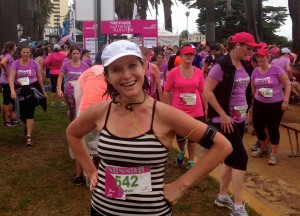Growing up my dad would often jokingly call me ‘bumble foot.’ By high school I had labeled myself as a bona-fide “non-athlete” and during school athletic carnivals, would only enter the walking race, too intimidated by the ‘real’ athletes to line up against them in sprints, hurdles or high jump. My pride was at stake!
As I’ve shared before, the stories (which include labels, assumptions and beliefs) we tell ourselves product differing emotions (whether ambition or resignation, anger or anxiety) which, in turn, drive our  behaviour (what we do, or don’t do; say, or don’t say) which, in turn, shape our lives… for better or worse.
behaviour (what we do, or don’t do; say, or don’t say) which, in turn, shape our lives… for better or worse.
Fast forward to Sunday just gone: I ran my first half-marathon!!! In the rain, half of it against the headwinds of Melbourne’s Port Phillip Bay, and despite all those stories I’d been telling myself (and others) for much of my life up until a few years ago. Indeed as my mum said to me, “When you were fourteen you would have said that was impossible!” Indeed I would have.
As I came to the last 5 kms and my legs were tiring, I had to dig deep. But I reminded myself that if it were easy to run 21 kms (13 miles), everyone would be. It’s the fact that it took me well outside my physical, mental and emotional comfort zone, and challenged me in new ways, that made that moment crossing the finish line so incredibly meaningful. I’d done it! I’d also done it faster than I’d expected (2.06 if you’re interested!). As my tears mixed with the rain rolling down my cheeks, so too did a sense of immense accomplishment mix with heartfelt gratitude. Gratitude that I could run the furthest I’d ever run in my life at an age that many would say was well past the age of ‘peak performance!’ I guess I’m a late bloomer!
Of course, hundreds of thousands of people, many older than me, run full marathons each year. I also now know that if I wanted to commit the training time I could run one also. But this newsletter isn’t about running. It’s about the stories we tell ourselves, often unconsciously, that limit what is possible for us in life — in our health, our wealth, our work and our relationships. For instance, what stories do you have about:
- The people in your life – family members, colleagues – that keep you from enjoying a more rewarding relationship with them?
- Who you are – your strengths, weaknesses, opportunities, and limitations – that limit the goals you pursue and what you can achieve?
- Money, your ability to earn it, build wealth and manage it well?
- Your body, your looks, your weight, and your health that keep you from taking actions that would improve your sense of well-being?
https://www.youtube.com/watch?v=G2Poq6MOf9k
We’re all cognitively wired to seek out information that confirms our stories and to actively ignore or discount evidence that contradicts them. And so any area of your life in which you feel a lack of satisfaction, freedom or power – you need to actively, bravely, look at where you are telling yourself a story that may be untrue and disempowering. I can promise you… any circumstance of your life where you feel ongoing dissatisfaction holds a story that isn’t serving you and needs a rewrite. (If have dedicated a full chapter in my book Find Your Courage on how to do just this!)
Speaking of stories, think about the story you have about your current To Do list as year end closes in. If its causing you any stress, then try this one instead:
I have enough time to do everything I really need to do before Christmas, and what I don’t get done doesn’t really matter.
Feel any lighter?
The simple 4 step formula:
1. Whenever you catch yourself feeling less than happy about something – manifest by complaining, making excuses, anxiety, resentful, hopeless, blaming, bitter or frustrated – ask yourself what story you’ve got about it, and how that story may be perpetuating the situation.
2. Look for evidence that contradicts your story and the assumptions embedded in it (E.g. Actively search for examples of people who are doing what you say can’t be done or think of times you have shown a strength you tell yourself you don’t have.)
3. Come up with a new story that will shift how you feel, and expand the actions you can take. (E.g. I’ve never managed money well before but I can learn the skills required.” or “This person isn’t evil, they are just lost and afraid.”
4. Repeat as often as necessary! (Pretty much until you drop dead.) You might just end up doing things you once thought were impossible!






